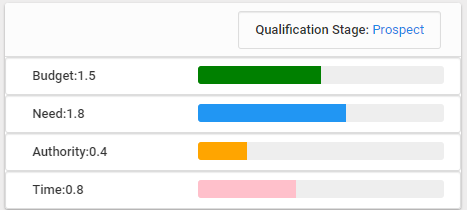The role of deal scoring in CRM
All salesmen are optimistic- it’s their nature; that is why they are in sales.
They honestly believe till the last hour that their deal will close. Even when the evidence piles up against them. This creates problems for the manager and of course the company.
Okay, so what deals are valuable?
Having talked with hundreds of customers across industries – my only answer is that it depends. It varies from industry to industry and even within the same industry, it varies from company to company. And, I am talking of companies who have actually invested the time to define the threshold of information and interest and how they measure both before passing it on to a sales guy.
All deals are not the same. All customers are not the same. Purchase procedures differ. Even different salesmen have different judgments about the same deal.
Deal scoring in CRM helps everyone evaluate deals using the same parameters.
How do you evaluate your win chances in a deal? How optimistic are you about your funnel?
How do you know the person committing to close a deal this month, is right about his optimism? Or the other salesperson, who equally vehemently argues against including his deal in the monthly forecast, is right?
Multiply the problem with 10- the number of your reportees. And another 10, for your reportees have reportees too. It’s a huge problem. Sales forecasting is a big problem.
Interest in the next step
Interest shown by the contact in being contacted it seems is a big factor behind the deal being taken seriosuly. Also, the nature of interest matters too. Some would simply want more information to be mailed, while the others might want a visit from a sales person. I know at least one company where professed interest in meeting a sales person is ruthlessly scrutinized because the sales people are so senior and their time, expensive.
Where telecallers inevitably falter
Almost all companies have a script for the their telecallers. But I have seen most falter in sifting through the tyre-kickers and the door-keepers. Sales does not like information gatherers- though in some B2B enterprise sales processes, information sharing is mandatory as part of a long sales process. Sales also wants to talk to decision makers- and most leads tend to be from folks who are merely gathering data for their bosses. You do not want to be at the mercy of people who are not able to represent your case in from of decision makers- though sometimes you may not have a choice.
Action, level and logical fit
Sales love leads where there is clear action plan and it is obviously set up at an appropriate decision making level at the customer place. If the lead is from a customer or industry segment which is a logical fit- that obviously helps. If it is not, the telecaller should try and establish the need or the pain-point of the lead.
To summarize, valuable sales leads are where meeting is set up at a decision making level where a logical product fit can be established. After this is done, the lead can transition to the sales person and who will have a lot more confidence in accepting it.
We can now legitinately call it a sales deal.
Qualifying a sales deal through the sales funnel
Sales deals have been subjected to “qualification” for a long time. The most popular and long tested method is BANT.
B- Budget, A-Authority, N-Need, T-Timeframe: are key parameters that are used to quickly sum up the chances of the deal progressing in the right way.
Now, every organization probably looks at BANT a little differently and that is okay. With Deal scoring in CRM, what they get is a method for standardization of the parameters. So, all deals get a standard score. That makes forecasting easier because that takes individual subjectivity out of the equation.
This totally makes sense especially when the team size is large. And the experience levels are vastly different. And that brings us to the next point.
Focus on key opportunities
Another key area where deal scoring in CRM helps is helping the salesman focus.
When you are new to sales, it can be hard to know what to focus on. The bigger one or the one down the road or the customer who always picks your phone or agrees to a meeting?
A CRM deal score helps achieve the objective- your rookie team member has his priorities set for him.
What do you think?
Do you think it makes sense to demand that your CRM gives you some feedback on the funnel which you can look at objectively.

